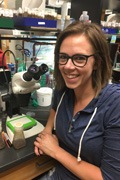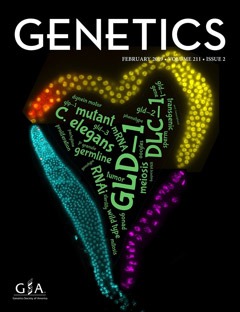Overview
The George W. Beadle Award honors individuals who have made outstanding contributions to the community of genetics researchers as a whole and led an exemplary research career. They will have contributed by creating and disseminating an invaluable technique or tool, helping the community adopt a model system, working to provide a voice for the community in public or political forums, and/or maintaining active leadership roles.
GSA established the award in 1999 in honor of George W. Beadle (1903-1989). Beadle was the 1946 GSA President and received the 1958 Nobel Prize in Physiology or Medicine for his work with Edward L. Tatum. The Beadle and Tatum experiments and their “one gene, one enzyme” theory established the linkage between biochemistry and genetics, setting the groundwork for the development of molecular biology.
Beadle was not only an outstanding scientist, but also a respected academic, administrator, and public servant. In addition to academic leadership positions, Beadle served numerous national and international leadership roles, including as chairman of the National Academy of Sciences Committee on the Biological Effects of Atomic Radiation, president of the American Association for the Advancement of Science, and chair of the Scientific Council of the American Cancer Society. He also spoke before school groups and the public, promoting science education and genetics education in particular.
Nomination Process and Instructions
Full instructions on how to nominate for a GSA Award are available here.
A nomination packet should include:
- Nominee name and contact information
- Nominator name and contact information (if different from the nominee)
- Cover Letter (250 words or fewer)
- NIH-style biosketch (5 pages or fewer)
- Lived-experience statement (250 words or fewer) Nominees should give an overview of their career path and scientific philosophy in 250 words or fewer. They are encouraged to describe their particular approaches to research, mentoring, teaching, and equity, as appropriate, and are welcome to include information about barriers they have faced and/or overcome.
- Selection questionnaire (see below)
- Demographic survey (optional)
Selection Questionnaire
- Provide 2 to 3 examples to illustrate the impact of the nominee’s leadership efforts on academia, science, and/or society (150 words or fewer)
- Describe the nominee’s leadership efforts in diversifying the academic environment and making it more inclusive. (100 words or fewer)
- If nominating more than one individual, describe the synergy among the nominees that enabled them to have a broad impact on the scientific enterprise. (150 words or fewer)
Eligibility
To be considered for the George W. Beadle Award, the nominee(s) need not be GSA member(s). However, nominees who are members of GSA will be given priority in the selection process. Individuals and teams can be nominated. There is no limit on the number of team members.
Important Dates
Nominations are due October 1, 2024.
Past Recipients
| 2024 | Deborah Andrew, Johns Hopkins University |
| 2023 | No award given |
| 2022 | Shirley M. Tilghman, Princeton University |
| 2021 | Chao-ting Wu, Harvard Medical School |
| 2020 | Julie Ahringer, University of Cambridge, UK |
| 2019 | Michael Snyder, Stanford University |
| 2018 | Phil Hieter, University of British Columbia |
| 2017 | Susan A. Gerbi, Brown University |
| 2016 | Susan E. Celniker, Lawrence Berkeley National Laboratory |
| 2015 | John H. Postlethwait, University of Oregon |
| 2014 | Hugo J. Bellen, Baylor College of Medicine and Howard Hughes Medical Institute |
| 2013 | R. Scott Hawley, Stowers Institute for Medical Research |
| 2012 | Therese Markow, University of California, San Diego |
| 2011 | Joseph R. Ecker, Salk Institute for Biological Studies |
| 2010 | William M. Gelbart, Harvard University |
| 2009 | Jay C. Dunlap, Dartmouth Medical School |
| 2008 | Mark Johnston, Washington University School of Medicine |
| 2007 | Robert K. Herman, University of Minnesota |
| 2006 | Fred Sherman, University of Rochester |
| 2005 | Thomas C. Kaufman, Indiana University |
| 2004 | Norbert Perrimon, Harvard Medical School and Howard Hughes Medical Institute |
| 2003 | Gerald M. Rubin, University of California, Berkeley |
| 2003 | Allan C. Spradling, Carnegie Institution of Washington |
| 2002 | André Goffeau, Université Catholique de Louvain, Belgium |
| 2002 | Robert K. Mortimer, University of California, Berkeley |
| 2001 | Gerald R. Fink, Whitehead Institute for Biomedical Research and Massachusetts Institute of Technology |
| 2000 | John Sulston, Sanger Centre |
| 2000 | Robert Waterston, Washington University in St. Louis |
| 1999 | Michael Ashburner, University of Cambridge, UK |



